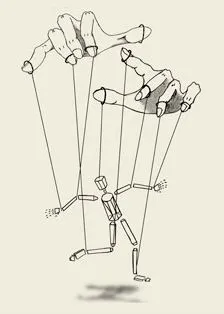In my previous two posts, I discussed Hegel's Sittlichkeit thesis and explained why freedom and autonomy are practically impossible within Hegel's ideal kingdom.
In this post, I'd like to explain shortly what autonomy means to me and how it is expressed.

The autonomous person
The autonomous person, I believe, is able to detach himself from customs and to impose unto himself his own moral rules. In other words, he is able to become a self-determinate atom that does not necessarily have to find his freedom through the recognition by an other. All that suffices for his autonomy is his personal recognition of himself as an individual who can and who must invent himself.
Unfortunately, the individual who is also the source of self-invention, is continually threatened in a world that imposes codified customs in the form of communal laws. Nonetheless, he reflects on the position that society has molded for him, rejects it, and consciously chooses which moral shape he will take. Doing so, he creates his own place in society.
1. Free association and the power to choose as an expression of Autonomy
Like Hegel, one may argue that communities like the civil society and its market place are essential for individuals to be recognized and to thrive beyond basic necessities, and that this is freedom. Nevertheless, I would like to stress the importance of choice for self-invention and voluntary association. Individuals should be free to voluntarily accept society and its laws; free to accept and reject duties towards the state or his fellow men. The individual manifests his autonomy in his choices. Therefore, the power to choose is the ultimate source of autonomy.
In Sittlichkeit, the individual is presupposed to be in unity with the family, civil society, and the state. All these social entities restrict his choice to dissociate himself from his communes.
2. The making of promises as an expression of Autonomy
The autonomous individual has a proud consciousness of power and freedom. He, as the lord of his free will, feels competent enough that he can control his own fate that he will bind himself to promises he makes to himself and to others. In other words, the autonomous individual has this grand potential of becoming a reliable person.
Friedrich Nietzsche writes of this autonomous individual that he,
The 'free' man, the owner of a long unbreakable will, finds in this possession his standard of value: looking out from himself upon the others, he honours or he despises, and just as necessarily as he honours his peers, the strong and the reliable... so with equal necessity will he have the heel of his foot ready for the lean and empty jackasses, who promise when they have no business to do so.

Conclusion
Autonomy is intricately linked to freedom and self-invention. It manifests itself in a strong desire to be in control of fate, in the ability of free association and choice, and in the power to become reliable persons.
References
Lim, C.L. (2017). Philosophy 101, #11: Freedom and Autonomy in Hegel’s Philosophy of Rights: https://steemit.com/philosophy/@chhaylin/philosophy-101-11-freedom-and-autonomy-in-hegel-s-philosophy-of-rights
Lim, C.L. (2017). Philosophy 101, #12: Can we achieve Freedom and Autonomy in Hegel's ideal Kingdom? https://steemit.com/philosophy/@chhaylin/philosophy-101-12-can-we-achieve-freedom-and-autonomy-in-hegel-s-ideal-kingdom
Nietzsche, F.W. (1886). Beyond Good and Evil: prelude to a philosophy of the future.